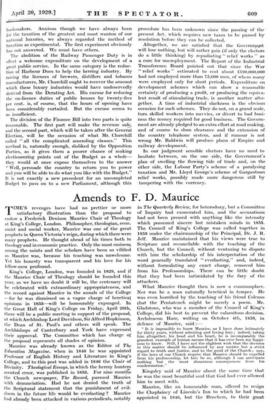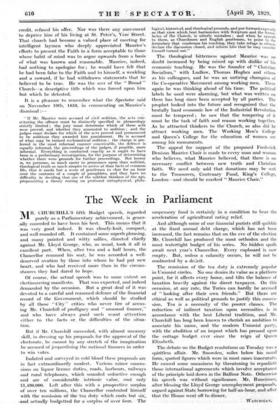Amends to F. D. Maurice T IME'S revenges have had no
prettier or more satisfactory illustration than the proposal to endow a Frederick Denison Maurice Chair of Theology at King's College, London. Philosopher, theologian, econ- omist and social worker, Maurice was one of the great prophets in Queen Victoria's reign, during which there were many prophets. He thought ahead of his times both in theology and in economic practice. Only the most eminent among the saints and the scholars have been so vilified as Maurice was, because his teaching was unwelcome. Yet his honesty was transparent and his love for his fellow-men profound.
King's College, London, was founded in 1829, and if the Maurice Chair of Theology should be founded this year, as we have no doubt it will be, the centenary will be celebrated with extraordinary appropriateness, and the record against Maurice in the annals of the College —for he was dismissed on a vague charge of heretical opinions in 1853—will be honourably expunged. In the Great Hall of King's College on Friday, April 26th, there will be a public meeting in support of the proposal, at which Archbishop Lord Davidson, Sir Alfred Hopkinson, the Dean of St. Paul's and others will speak. The Archbishops of Canterbury and York have expressed their approval. The Committee which has charge of the proposal represents all shades of opinion.
Maurice was already known as the Editor of The Education Magazine, when in 1840 he was appointed Professor of English History and Literature in King's College, and to this post was added in 1846 the Chair of Divinity. Theological Essays, in which the heresy hunters scented error, was published in 1853. For nine months the Church newspaper, The Record, pursued Maurice with denunciation. Had he not denied the truth of the Scriptural statement that the punishment of evil- doers in the future life would be everlasting ? Maurice had already been.attacked in various periodicals, notably in The Quarterly Review, for heterodoxy, but a Committee of Inquiry had exonerated him, and the accusations had not been pressed with anything like the intensity which possessed sincere but mistaken minds in 1858. The Council of King's College was called together in 1858 under the chairmanship of the Principal, Dr. J. R. Jeff. Maurice maintained that his views were true to Scripture and reconcilable with the teaching of the Church, but the Council, without venturing to dispute with him the scholarship of his interpretation of the word generally translated " everlasting," and, indeed, without formulating any exact charge, removed him from his Professorships. There can be little doubt that they had been intimidated by the fury of the attackers.
What Maurice thought then is now a commonplace. Nor was he a man naturally heretical in temper. He was even horrified by the teaching of his friend Colenso that the Pentateuch might be merely a poem. Mr. Gladstone, who was a member of the Council of King's College, did his best to prevent the calamitous decision. Archdeacon Hare, writing on October 4th, 1858, in defence of Maurice, said :- " It is impossible to know Maurice, as I have done intimately for thirty years, without admiring and loving him ; indeed, taking him altogether, his head and his heart, he is incomparably the grandest example of human nature that it has ever been my happi- ness to know. Still, I have not the slightest wish that the decision in this matter should be influenced by any motive but a strict regard to truth and justice, and to the good of the Church ; nay, if the laws of our Church require that Maurice should be expelled from his professorship, let him be so, although I can anticipate nothing but the most disastrous consequences from his condemnation."
Kingsley said of Maurice about the same time that he was the most beautiful soul that God had ever allowed him to meet with.
Maurice, like an honourable man, offered to resign the Chaplaincy of Lincoln's Inn to which he had been appointed in 1846, but the. Benchers, to their great credit, refused his offer. Nor was there any movement . , to deprive him Of -hiS living at -St: Peter's, Vet* Street.
That church had become a valued place of meeting fOr intelligent laymen who deeply appreciated Maurice's efforts to present the Faith in a forM acceptable to those whose habit of mind was to argue upwards from a basis of what was known and reasonable. Maurice, indeed, had nothing to apologise for ; he would have felt that he had been false to the Faith and to himself, a weakling and a coward, if lie had withdrawn statements that he believed to be true. He was the seer of the " Broad " Church—a descriptive title which was forced upon him but which he detested. • It is a pleasure to remember what the Spectator said on November 19th, 1853, in commenting on Maurice's dismissal :— "If Mr. Maurice were accused of civil sedition, the acts con- stituting the offence must be distinctly specified in phraseology strictly limited ; the. jury must determine which of these acts were proved, and whether they amounted to sedition ; and the judges must declare for which of the acts proved and pronounced to be seditious .they awarded him punishment. He is accused of what may be termed ecclesiastical sedition ; the charge is pre- ferred in the most informal manner conceivable, the defence is equally informal, the proceedings of the judges, if possible, more informal. Everything is conducted exactly as it ought to have been in a preliminary investigation, for the purpose of determining whether there were grounds for further proceedings. But heresy is, we presume, so much easier to pronounce upon than sedition, theological truth so much simpler to arrive at than facts of common life, that it needs but a score of gentlemen to chat for an hour over the contents of. a couple of pamphlets, and they have no difficulty in deciding that one of the subtlest thinkers of the age, propounding a theory resting on profound metaphysical, philo- logical, historical; and theoloeical grounds, and put forward expressly . as,that .which_best harmonizes_with Scripture and the formu- laries of the Church, ie utterly mistaken ; and when he appea/s to them, as Churchmen and English gentlemen, to point to the formulary that condemns his teaching, they take refuge in silence, declare the discussion closed, and inform' him that. he may consider himself turned out."
The theological -bitterness -against' Maurice was no 'doubt increased by being mixed up * with dislike of his economic teaching. He was the founder of " Christian Socialism," with Ludlow, Thomas Hughes and others as his colleagues, and he was an untiring champion of the Co-operative Movement among working men. There again he was thinking ahead of his time. The political labels he used were alarming, but what was written on them has long since been accepted by all partieS. The prophet looked into the future and recognized that the brutally hard economic law • of the Industrial ReVolution must be tempered ; he saw that the tempering of it must be the task of faith and reason working together. As he attracted- thinkers to the Church, so also did he attract working men. The Working Men'S' College and Queen's College–for the education Of women are among his monuments.
The appeal for support of the proposed Frederick Denison Maurice Chair' is made -to every man and woman who believes, what Maurice believed, that there is no necessary conflict between new truth and Christian faith. We need only add that donations may be sent to the Treasurers, Centenary Fund, King's College, London—arid" should be marked " Maurice Chair."

























































 Previous page
Previous page